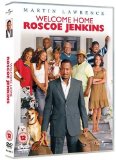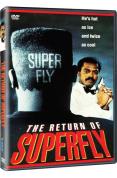![The Color Purple [1985]](/pictures/1020857.jpg) The Color Purple | DVD | (17/04/2019)
from £8.95
| Saving you £5.04 (56.31%)
| RRP
The Color Purple | DVD | (17/04/2019)
from £8.95
| Saving you £5.04 (56.31%)
| RRP Steven Spielberg, proving he's one of the few modern filmmakers who has the visual fluency to be capable of making a great silent film, took a melodramatic, DW Griffith-inspired approach to filming Alice Walker's novel. His tactics made the film controversial, but also a popular hit. You can argue with the appropriateness of Spielberg's decision, but his astonishing facility with images is undeniable--from the exhilarating and eye-popping opening shots of children playing in paradisiacal purple fields to the way he conveys the brutality of a rape by showing hanging leather belts banging against the head of the shaking bed. In a way it's a shame that Whoopi Goldberg, a stage monologist who made her screen debut in this movie, went on to become so famous, because it was, in part, her unfamiliarity that made her understated performance as Celie so effective. (This may be the first and last time that the adjective understated can be applied to Goldberg.) Nominated for 11 Academy Awards, including best picture and actress (supporting players Oprah Winfrey and Margaret Avery were also nominated), it was quite a scandal--and a crushing blow to Spielberg--when The Color Purple won none. --Jim Emerson
![Magnum Force [1973]](/pictures/1003585.jpg) Magnum Force | DVD | (21/01/2002)
from £11.99
| Saving you £2.00 (16.68%)
| RRP
Magnum Force | DVD | (21/01/2002)
from £11.99
| Saving you £2.00 (16.68%)
| RRP This first sequel to Dirty Harry was written by a couple of strong voices, writer-directors Michael Cimino (The Deer Hunter) and John Milius (Farewell to the King). But that doesn't mean the film is particularly good. After Don Siegel's ferociously dark style in the first movie, Ted Post's blocky, television-ish direction in Magnum Force is a huge letdown. The story doesn't win any prizes, either. Eastwood's San Francisco detective Harry Callahan (apparently having retrieved his badge after throwing it away at the end of Dirty Harry) takes on a vigilante squad within the city's police force. David Soul is pretty convincing as the major spokesman for these right-wing avengers. Eastwood, on the other hand, had already turned Callahan from fascinating outsider in Siegel's film to purveyor of tough-guy shtick in this one. --Tom Keogh
![The Color Purple (Special Edition) [1985]](/pictures/1019032.jpg) The Color Purple (Special Edition) | DVD | (21/07/2003)
from £17.54
| Saving you £-2.29 (N/A%)
| RRP
The Color Purple (Special Edition) | DVD | (21/07/2003)
from £17.54
| Saving you £-2.29 (N/A%)
| RRP Steven Spielberg took a melodramatic DW Griffith-inspired approach to filming Alice Walker's novel The Color Purple. His tactics made the film controversial, but also a popular hit. You can argue with the appropriateness of Spielberg's decision, but his astonishing facility with images is undeniable--from the exhilarating and eye-popping opening shots of children playing in paradisiacal purple fields to the way he conveys the brutality of a rape by showing hanging leather belts banging against the head of the shaking bed. In a way it's a shame that Whoopi Goldberg, a stage monologist who made her screen debut in this movie, went on to become so famous, because it was, in part, her unfamiliarity that made her understated performance as Celie so effective. (This may be the first and last time that the adjective "understated" can be applied to Goldberg.) Nominated for 11 Academy Awards, including best picture and actress (supporting players Oprah Winfrey and Margaret Avery were also nominated), it was quite a scandal--and a crushing blow to Spielberg--when The Color Purple won none. --Jim Emerson, Amazon.comOn the DVD: The Color Purple makes a sumptuous transfer to DVD in this special edition. The lush and vibrant cinematography is well served by the widescreen format; Quincy Jones's warmly enveloping score, shot through with jazz age references, is superbly enhanced by surround sound. The extras are ideal companions to the main picture, detailing the passage of Alice Walker's novel from book to screen. Walker herself recalls the anxieties of the process, while director Spielberg and various cast members remember many poignant moments during and after filming, reminding us with a jolt that this beautifully made, hugely popular and inspirational film didn't win a single Academy Award. --Piers Ford
 Welcome Home Roscoe Jenkins | DVD | (01/03/2010)
from £27.32
| Saving you £-14.33 (N/A%)
| RRP
Welcome Home Roscoe Jenkins | DVD | (01/03/2010)
from £27.32
| Saving you £-14.33 (N/A%)
| RRP A successful talk show host leaves Los Angeles to reunite with his family in the Deep South.
![Proud Mary [DVD]](/pictures/1147305.jpg) Proud Mary | DVD | (30/07/2018)
from £7.05
| Saving you £N/A (N/A%)
| RRP
Proud Mary | DVD | (30/07/2018)
from £7.05
| Saving you £N/A (N/A%)
| RRP Lethal, professional hitwoman Mary (Taraji P. Henson) works for the most notorious crime family in town, headed by Benny (Danny Glover). When Mary shoots a protected mobster in order to save a young boy, she must take on a rogues' gallery of crime figures, from the Russian Mafia to those closest to her, including her former lover. Armed with her wits and a closet full of guns Mary must do whatever it takes to be the last woman standing in this energetic and explosive action thriller. Features: Mary's World featurette The Beginning of the End featurette If Looks Could Kill featurette
![Which Way Is Up? [1977]](/pictures/1080500.jpg) Which Way Is Up? | DVD | (25/02/2008)
from £6.99
| Saving you £6.00 (85.84%)
| RRP
Which Way Is Up? | DVD | (25/02/2008)
from £6.99
| Saving you £6.00 (85.84%)
| RRP Richard Pryor plays three roles - a beleaguered sex-starved farm worker named Leroy Jones; the farm worker's randy old father Rufus; and the hypocritical town preacher Rev. Lenox Thomas - and Pryor has never been so outrageously funny. The lives and love lives of these three men cross and crisscross as Leroy tries to get his life back on track. The fun kicks into high gear when Leroy moves from labor to management. He tries to juggle his wife and his girlfriend but the only peace he can find the arms of the Reverend's wife! It's a case of too many women and too little time. No wonder he doesn't know Which Way Is Up?.
![Cyborg 3 [1995]](/pictures/1003809.jpg) Cyborg 3 | DVD | (03/09/2001)
from £9.00
| Saving you £-3.02 (N/A%)
| RRP
Cyborg 3 | DVD | (03/09/2001)
from £9.00
| Saving you £-3.02 (N/A%)
| RRP Enter the dark world of sythentic humanoids where ruthless recyclers scavenge cyborg parts and sell them to the highest bidder.
![The Return Of The Superfly [1999]](/pictures/1002775.jpg) The Return Of The Superfly | DVD | (12/04/2005)
from £12.65
| Saving you £-6.66 (N/A%)
| RRP
The Return Of The Superfly | DVD | (12/04/2005)
from £12.65
| Saving you £-6.66 (N/A%)
| RRP Ex-drug dealer Superfly is persuaded to return to America in order to trap the current dealers....
![The Richard Pryor Collection [DVD]](/pictures/1144702.jpg) The Richard Pryor Collection | DVD | (18/09/2017)
from £16.85
| Saving you £N/A (N/A%)
| RRP
The Richard Pryor Collection | DVD | (18/09/2017)
from £16.85
| Saving you £N/A (N/A%)
| RRP An all new Richard Pryor DVD gifting set. The set features 4 DVDs in a slipcase and includes his 1976 comedy musical Car Wash also starring The Pointer Sisters. The 1978 fantasy musical adventure. The Wiz a film based on the classic Wizard of Oz, also starring Michael Jackson and Diana Ross. The 1978 farcical comedy Which Way is Up sees Pryor acting in three roles, which Eddie Murphy has so famously now made a career of. And finally one of Pryor s greatest commercial successes the 1985 smash hit comedy Brewster s Millions also starring John Candy.
 Return of Superfly | DVD | (03/09/2007)
from £N/A
| Saving you £N/A (N/A%)
| RRP
Return of Superfly | DVD | (03/09/2007)
from £N/A
| Saving you £N/A (N/A%)
| RRP This pumping action thriller sees the return of Priest - former Harlem heroin kingpin out for vengeance. Having escaped his past life as a dealer and now living in France Priest is drawn back to his old ways in order to avenge the death of his former partner Eddie. Return of Superfly includes a platinum selling sound track by Curtis Mayfield and also features Samuel L Jackson.
![Which Way Is Up? [DVD] [1977]](/pictures/1096478.jpg) Which Way Is Up? | DVD | (19/10/2009)
from £19.99
| Saving you £-14.00 (N/A%)
| RRP
Which Way Is Up? | DVD | (19/10/2009)
from £19.99
| Saving you £-14.00 (N/A%)
| RRP Richard Pryor plays three roles - a beleaguered sex-starved farm worker named Leroy Jones; the farm worker's randy old father Rufus; and the hypocritical town preacher Rev. Lenox Thomas - and Pryor has never been so outrageously funny. The lives and love lives of these three men cross and crisscross as Leroy tries to get his life back on track. The fun kicks into high gear when Leroy moves from labor to management. He tries to juggle his wife and his girlfriend but the only peace he can find the arms of the Reverend's wife! It's a case of too many women and too little time. No wonder he doesn't know Which Way Is Up?.
![Welcome Home Roscoe Jenkins [DVD]](/pictures/1132075.jpg) Welcome Home Roscoe Jenkins | DVD | (04/02/2013)
from £N/A
| Saving you £N/A (N/A%)
| RRP
Welcome Home Roscoe Jenkins | DVD | (04/02/2013)
from £N/A
| Saving you £N/A (N/A%)
| RRP While its story might sound terribly interesting, Welcome Home Roscoe Jenkins is largely a vehicle for gross-out sight gags and grotesque performances by performers who, in many cases, don't need to do such things. Martin Lawrence stars as R.J. Stevens, a successful, Jerry Springer-like, television talk show host who sets aside his perfect life with a sweet son (Damani Roberts) and celebrity girlfriend (Joy Bryant) to attend his parents' golden wedding anniversary back home in Georgia. From the moment he arrives, all the reasons R.J. left to reinvent himself on the West Coast become clear. His siblings and cousins (Mike Epps, Mo'Nique, Michael Clarke Duncan, Cedric the Entertainer) quickly put him in his place, reminding him that his name is actually Roscoe Jenkins. His sweet mother (Margaret Avery) watches impassively while R.J.'s dad (James Earl Jones) strikes one disapproving note after another. R.J. would be content to wait out the anniversary events and go home, but the arrival of a woman (Nicole Ari Parker) he loved but couldn't keep during his adolescence changes everything, bringing out the competitive survivor within. Written and directed by Malcolm D. Lee (Undercover Brother), Welcome Home Roscoe Jenkins promises rich comedy and dramatic flavourings, as well as a bunch of delightful actors doing what only they can do best. But Lee subverts the project for cheap and easy laughs, using his best material to do little else than bridge scenes of bad slapstick, bestial perversity, clownish sex and irritating, motormouth rants from the likes of Mo'Nique and Epps. This a hard movie to sit through at 114 minutes, one of those what-were-they-thinking-when-they-made-this films. --Tom Keogh

Please wait. Loading...
This site uses cookies.
More details in our privacy policy